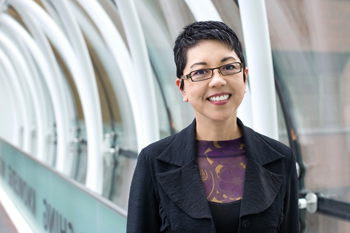St. Michael’s researcher asked to chair global committee on addressing health inequity

By Selma Al-Samarrai

Dr. Patricia O’Campo
Social determinants of health, or social aspects such as housing and employment that influence health care, are the main drivers of health outcomes, according to a global declaration established by the World Health Organization (WHO). Governments play a key role in addressing social determinants of health to improve the lives of their citizens.
In 2011, 125 countries including Canada signed a declaration to commit to addressing social determinants to health in an effort to reduce health inequities around the world. This global declaration was named the Rio Political Declaration on Social Determinants of Health.
Last year, Dr. Patricia O’Campo, interim vice-president of Research at St. Michael’s, and a researcher in the Centre for Urban Health Solutions, chaired a global committee to identify indicators that the countries involved in this declaration can use to measure how social determinants of health impacted health care in their country, and what progress they were making to address them.
“This is the first ever global monitoring system that looks at what governments are doing and how they’re addressing social determinants of health. Before this, we typically only measured health endpoints our outcome,” explained Dr. O’Campo.
The committee was established by the WHO, the Public Health Agency of Canada and the Canadian Institutes of Health Research-Institutes of Population and Public Health. Their findings were published last month.
The committee led by Dr. O’Campo created a total of 36 indicators including level of public social protection, gender inequities, income inequities, public laws guaranteeing self-determination of indigenous peoples, and public laws guaranteeing human rights for sex workers.
“We identified indicators that align with our principles and that include measurement concepts because we want the process of measurement to be very rigorous,” explained Dr. O’Campo.
The importance of the indicators, according to Dr. O’Campo, is that they clearly identify which areas countries should monitor and report. The indicators act as a guide to governments on what they should be addressing in order to tackle health inequities, if they aren’t already doing so.
In addition to chairing this global committee, Dr. O’Campo’s work as a social epidemiologist has included conducting numerous studies on identifying gaps in social determinants of health and implementing solutions to growing health inequities around the world.
“What I really love about this monitoring system is that it’s going beyond the talk. We’re really holding governments accountable to address health inequities across the globe.”
The WHO is currently collecting the data on the indicators to create a baseline, and Dr. O’Campo expects this work will be complete some time in 2019.
About St. Michael’s Hospital
St. Michael’s Hospital provides compassionate care to all who enter its doors. The hospital also provides outstanding medical education to future health care professionals in more than 29 academic disciplines. Critical care and trauma, heart disease, neurosurgery, diabetes, cancer care, care of the homeless and global health are among the Hospital’s recognized areas of expertise. Through the Keenan Research Centre and the Li Ka Shing International Healthcare Education Centre, which make up the Li Ka Shing Knowledge Institute, research and education at St. Michael’s Hospital are recognized and make an impact around the world. Founded in 1892, the hospital is fully affiliated with the University of Toronto.
St. Michael’s Hospital with Providence Healthcare and St. Joseph’s Health Centre now operate under one corporate entity as of August 1, 2017. United, the three organizations serve patients, residents and clients across the full spectrum of care, spanning primary care, secondary community care, tertiary and quaternary care services to post-acute through rehabilitation, palliative care and long-term care, while investing in world-class research and education.
